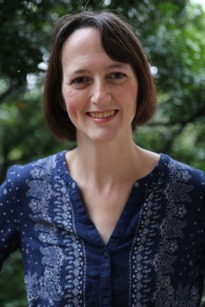 A Catholic priest’s trek through 16th century Latin America helped local parishioner Becky Watts make some modern history – on a national level.
A Catholic priest’s trek through 16th century Latin America helped local parishioner Becky Watts make some modern history – on a national level.
A middler (second-year student in a three-year course of study) from the Diocese of Central Florida at the Episcopal Seminary of the Southwest in Austin, Texas, Watts recently wrote an essay about a quote from a 16th century Catholic priest who had spent time on missionary work in Latin America. The essay was part of a final exam for her History of Christianity II course last spring – a piece of writing so fascinating that she decided to enter it in a contest.
The result was a good one for Watts, whose essay “They Are No Less Capable of Our Christianity: Sixteenth-Century Catholic Missions in Indigenous Cultural Contexts” took first place in “The Living Church” magazine’s essay contest. Watts’ essay will appear in the Oct. 8 issue.
“Publishing this essay in ‘The Living Church’ feels like validation of this path I am taking now through seminary toward ordination,” said Watts, a parishioner at St. Peter’s Episcopal Church in Lake Mary. “This recognition is especially important as I am discerning ways to blend my experiences in writing and research with my future ministry as an Episcopal priest.”
Watts said she had been hoping to start writing for “The Living Church” at some point, so the contest presented the opportunity for her to try. After revising her essay, she sent the piece in and beat out competitors from across the country.
Second place went to Edward Watson from the Yale Divinity School for his “Seeking Wisdom in the Spaces of Schism: How Hooker and Coleridge’s Accounts of Reason Can Support Christian Unity.”
Taking third was Martin Geiger of Virginia Theological Seminary for his “History, Theology, and Mediation: Wisdom’s Female Character in Proverbs 1-9.”
The main idea for Watts’ essay came after her history class studied early missions that spread Christianity to Asia, Africa, and the Americas. More specifically, the class looked at historical documents from Catholic priests in 16th century Latin America. Dr. Dan Joslyn-Siemiatkoski taught the class.
“What I found fascinating and instructive is how the Catholic Church – from the Pope at the time to scholars and the missionary priests themselves – realized how crucial it was to teach and learn the languages and cultures of the people they were encountering,” Watts said. “In these documents, the Catholic Church appears much more sensitive to and respectful of the indigenous people than the Spanish and Portuguese colonizers were. We can learn from these 16th century missionary priests by emulating their ways of learning about and showing respect for the cultural identities of the people in the communities in which we minister.”
The essay on the 16th century priests is the latest recognition for Watts, who said she also has been honored for writing as a graduate student in Communications Studies.
Watts said she plans to continue writing upon graduation from Seminary in May 2019. Meanwhile, she will stay busy with her seminary studies in Texas. At the January 2017 diocesan convention, Watts was elected to serve as 3rd Alternate Deputy to the General Convention in Austin, Texas, representing the Diocese of Central Florida.
“Ideally, I would like to combine my work as a priest with writing and continuing to teach,” said Watts, who previously served on the faculty at Stetson University. “I am especially interested in campus ministry, racial reconciliation, and reimagining ways to combine our Episcopal liturgy and traditions with evangelism and community outreach.”
